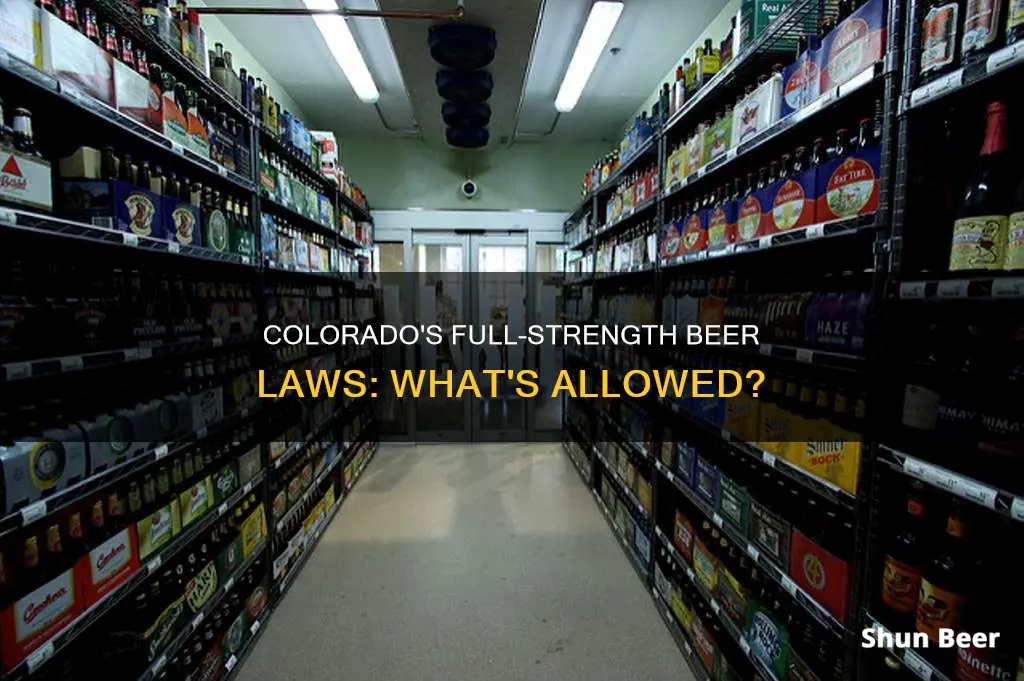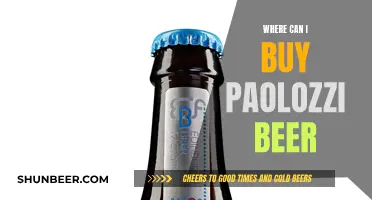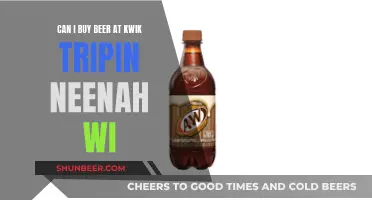
On January 1, 2019, Colorado's unusual booze rules underwent a significant change. For the first time since Prohibition, consumers were allowed to buy full-strength beer at grocery and convenience stores. This change was a result of the repeal of the 3.2 beer law, a Prohibition-era restriction that limited most general stores to selling only low-alcohol beer. The new law, approved by the state legislature in 2016 and expanded upon in 2018, eliminated the two-tier system and allowed all licensed retailers to sell beer regardless of alcohol content. While this change was celebrated by consumers and grocery stores, it sparked concerns among liquor stores about increased competition and potential business losses.
| Characteristics | Values |
|---|---|
| Date of change | 1st of January, 2019 |
| Previous law | 3.2 beer law |
| Previous maximum alcohol content | 3.2% alcohol by weight or 4% alcohol by volume |
| New maximum alcohol content | Over 0.5% |
| Previous retailers | Grocery and convenience stores with 3.2% beer licenses |
| New retailers | Grocery and convenience stores with beer licenses |
| Beer sales hours | 8 a.m. to midnight |
| Minimum age to handle alcohol | 18 years |
| Minimum age to buy beer | 21 years |
What You'll Learn

Full-strength beer in Colorado grocery stores
On January 1, 2019, Colorado's unusual booze rules underwent a significant change. For the first time since Prohibition, Colorado shoppers were allowed to buy full-strength beer at grocery stores. Before this, only low-alcohol "3.2 beer" was sold in most of the state's grocers. The change was a result of an overhaul of the state's liquor laws, which were previously aligned with Prohibition-era standards.
The new law eliminated the two-tier system for beer sales, allowing all retailers licensed to sell beer to do so, regardless of alcohol content. This means that full-strength beer can now be purchased at liquor stores, grocery stores, convenience stores, gas stations, and big-box retailers such as Walmart, Target, Costco, and Sam's Club. The hours for beer sales are 8 am to midnight.
The change in the law was a cause for concern for liquor stores, which projected significant business losses due to increased competition. It also raised questions for craft brewers, who may struggle to get their products on supermarket shelves. However, the grocery chains have expressed willingness to work with smaller brewers.
The new law also impacted the types of alcoholic beverages allowed in state parks. Full-strength beer, wine, and champagne are now permitted in Denver parks, whereas previously, only 3.2 beer was allowed.
Beer Delivery: DoorDash's Alcohol Ordering Service Explained
You may want to see also

Prohibition-era restrictions on full-strength beer
The Prohibition era in the United States, lasting from 1920 to 1933, witnessed a range of restrictions on the production, importation, transportation, and sale of alcoholic beverages. One notable aspect of this period was the limitation on the sale of full-strength beer, which continued to impact beer sales in Colorado even after Prohibition was repealed.
During Prohibition, the Eighteenth Amendment prohibited the manufacture, sale, and transportation of intoxicating liquors, but it did not outlaw possession or consumption. This meant that people could still legally drink alcohol in the privacy of their homes if they had stockpiled it before the ban. However, the Volstead Act, passed in 1919 to enforce the Eighteenth Amendment, defined "intoxicating beverages" as those with an alcohol content greater than 0.5%, effectively banning full-strength beer.
In Colorado, the impact of Prohibition on beer sales extended beyond the nationwide ban. Even after Prohibition was repealed in 1933, the state continued to restrict the sale of full-strength beer in grocery and convenience stores. This was due to a Prohibition-era restriction known as the 3.2 beer law, which limited beer sales in these stores to beer with an alcohol content of 3.2% by weight or 4% by volume.
The 3.2 beer law in Colorado prevented many supermarkets and convenience stores from selling full-strength beer, forcing consumers who wanted higher-alcohol options to go to liquor stores. This restriction remained in place for decades, with Colorado only repealing it on January 1, 2019. After this date, grocery and convenience stores in the state were allowed to sell full-strength beer, providing consumers with a more convenient option for purchasing their preferred alcoholic beverages.
The repeal of the 3.2 beer law in Colorado marked a significant shift in the state's alcohol regulations and brought an end to a Prohibition-era restriction that had lasted for decades. It represented a move towards greater accessibility of full-strength beer and a recognition of changing consumer preferences and market demands.
Purchasing Beer Legally on Your 21st Birthday: What You Need to Know
You may want to see also

Changes to state liquor laws in Colorado
On January 1, 2019, Colorado's unusual alcohol laws underwent significant changes, marking the most substantial transformation since Prohibition. The changes were part of an industry regulatory overhaul approved by the state legislature in 2016 and further expanded by additional legislation in 2018.
The End of Prohibition-Era Restrictions
Colorado's 3.2 beer law, a remnant of the Prohibition era, was repealed. This restriction had previously prevented grocery and convenience stores from selling full-strength beer, capping the alcohol content at 3.2% by weight or 4% by volume. With the new changes, these stores were allowed to sell beer containing more than 3.2% alcohol by weight or 4% alcohol by volume. This change applied to grocery stores, convenience stores, gas stations, and big-box retailers like Walmart, Target, Costco, and Sam's Club.
Impact on Retailers and Consumers
The changes had a notable impact on retailers and consumers alike. For retailers, it meant a shift in their product offerings and store layouts to accommodate full-strength beer. Convenience and grocery stores with existing 3.2 licenses were now eligible to offer regular, full-strength beer. This change provided consumers with a one-stop shopping experience, allowing them to purchase full-strength beer alongside their groceries or at their local convenience store.
Liquor Store Concerns
While the changes were celebrated by many consumers and some retailers, existing liquor stores expressed concerns about the potential impact on their businesses. They anticipated significant business losses due to increased competition for beer sales. Liquor stores also received some protections, such as distance requirements for new alcohol-selling stores, and the ability to sell more food items alongside drinks.
Changes to Alcohol Consumption Locations
The new laws also brought changes to where alcohol could be consumed. Full-strength beer, wine, and champagne were permitted in Denver parks for adults aged 21 and over, with the city reviewing the results after a year. Additionally, all forms of alcoholic beverages were allowed in most state parks, marking a shift from the previous restriction of only allowing 3.2 beer.
Other Notable Changes
The minimum age requirement for handling alcohol in stores was lowered from 21 to 18 years old. Additionally, there were changes to the number of licenses that could be held for Fermented Malt Beverage (FMB) licenses, with no limits imposed going forward. The laws also addressed the delivery of full-strength beer, outlining specific conditions under which it could be delivered to individuals of legal age.
Buying Beer After Midnight in FoCo: Where to Go?
You may want to see also

Liquor stores' concerns about competition
On January 1, 2019, Colorado's unusual booze rules underwent a significant change. The state eradicated its 3.2 beer law, a Prohibition-era restriction, allowing grocery and convenience stores to sell full-strength beer. This change has raised concerns among liquor store owners about the impact on their businesses due to increased competition.
Liquor store owners in Colorado have expressed apprehension about the potential loss of business as a result of the new law. They anticipate a considerable decline in beer sales, estimating a drop of around 30%. This is a significant concern for liquor stores, as beer sales constitute a substantial portion of their revenue. The increased competition from grocery and convenience stores selling full-strength beer may lead to a shift in consumer behavior, with customers opting for the convenience of one-stop shopping.
To address these concerns, the new law includes certain protections for liquor stores. Distance requirements have been implemented for new alcohol-selling stores, and liquor stores are allowed to operate a second location. Additionally, liquor stores can now sell more food items, such as snacks, as long as they don't exceed 20% of their total sales. These concessions aim to mitigate the impact of the increased competition on liquor stores.
However, despite these protections, liquor store owners still face challenges. The change in the law has the potential to significantly impact their bottom line, and they are unsure about the extent of the shift in beer sales. Some store owners predict that several independent liquor stores across Colorado may be forced to close due to the loss in beer sales over the next few years.
The competition from grocery and convenience stores, which offer a wider range of products and the convenience of one-stop shopping, poses a significant threat to liquor stores. It remains to be seen how the market will adapt to these changes and whether liquor stores will be able to maintain their customer base in the face of increased competition.
Buying Beer in Michigan: Grocery Store Guide
You may want to see also

Beer strength and alcohol percentage
Beer strength is typically measured by its alcohol by volume (ABV) percentage. The higher the ABV, the stronger the beer. Factors that influence the strength of a beer include the type of yeast used during fermentation, the length of the fermentation process, and the amount of sugar in the wort.
In the United States, beer with an ABV of up to 4% is considered "low-alcohol" or "session" beer. These beers are sometimes referred to as "3.2 beer" because they contain 3.2% alcohol by weight, which is equivalent to 4% ABV. Until recently, the state of Colorado had a Prohibition-era law that restricted most grocery and convenience stores to selling only this low-alcohol beer. This meant that consumers who wanted to purchase full-strength beer had to do so at liquor stores.
However, as of January 1, 2019, Colorado's unusual booze rules underwent a significant change. The state eliminated the restriction on the maximum alcohol content of fermented malt beverages, allowing grocery and convenience stores to sell beer with an ABV of more than 4%. This change was part of an industry regulatory transformation approved by the state legislature in 2016 and expanded upon with additional legislation passed in 2018.
The impact of this change on the beer market in Colorado was expected to be significant. Liquor store owners anticipated a major hit to their beer sales, with a potential drop of up to 30% as they faced increased competition from grocery and convenience stores. On the other hand, craft brewers had a new opportunity to get their products on supermarket shelves, although smaller brewers might struggle to compete with larger breweries for shelf space.
With the change in the law, consumers in Colorado gained the convenience of being able to purchase full-strength beer while also checking off their grocery lists. This shift in the beer landscape highlighted the evolving nature of alcohol regulations and the ongoing balance between consumer demand, business interests, and public health considerations.
Last Call for Beer in Kansas: Know the Rules
You may want to see also
Frequently asked questions
Yes, as of January 1, 2019, consumers can purchase full-strength beer at grocery and convenience stores in Colorado.
Previously, only low-alcohol "3.2 beer" was sold in most of the state's grocers. The beer sold at grocery and convenience stores was limited to 3.2% alcohol by weight or 4% alcohol by volume.
The change is part of an overhaul approved by state lawmakers in 2016 to update the state's alcohol laws from Prohibition-era standards.
Full-strength beer can be purchased at liquor stores, grocery stores, convenience stores, gas stations, and big-box retailers such as Walmart, Target, Costco, and Sam's Club.







